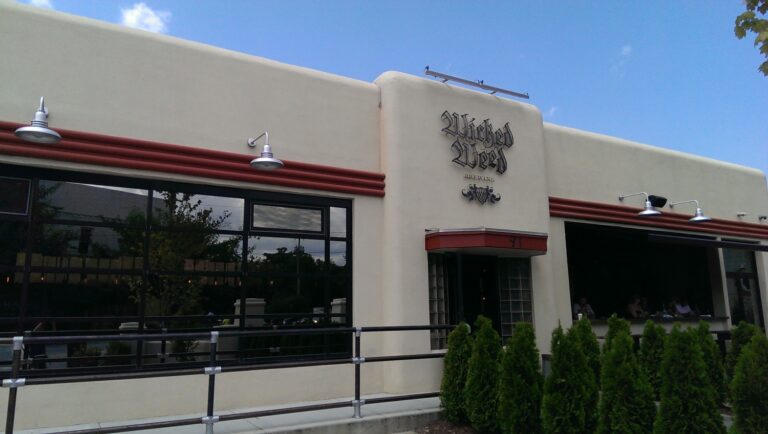Why Wicked Weed Sold Out to AB-InBev

The big news today in Asheville is the sale of Wicked Weed to brewing mega-conglomerate Anheuser Busch-InBev. Wicked Weed, a local success story and arguably Asheville’s most popular brewery, has traded its independence for a check from the world’s largest brewery owner. While many in Asheville are saddened and shocked by this decision, the unfortunate realities of the beer industry make these sales all too common. AB-InBev purchased 10 breweries recently, ranging from Elysian in Washington State to Devil’s Backbone of Virginia. The big question on everyone’s minds is why Wicked Weed?
Why did Wicked Weed Sell Out?
Full disclosure, I helped open Wicked Weed and have known the owners since long before the dream of opening a brewery in Asheville even seemed feasible. I have watched Wicked Weed grow from a popular brewpub in downtown Asheville to a production brewery and on to become the largest producer of sour beer in the Southeast. Up until news of this sale they were featured on our brewery tours in Asheville. I have admired their attention to quality and strong commitment to their employees, and this brewery holds a special place in my heart. I will also make it clear that I have not spoken to anyone in a decision-making position at Wicked Weed and can only make educated guesses as to the reason for the sale. Everything below should be taken with a grain of salt. The way I see it, there are four reasons why Wicked Weed might have sold out. Any one of these, or a combination thereof, is probably the truth.
Too Big of a Check to Turn Down?
There is a lot of money flowing into the pockets of brewery owners these days when they sell to one of the big brewers. Ballast Point of San Diego sold for $1 Billion to Constellation Brands when it was by all measures worth somewhere around $100 million. While Wicked Weed was almost certainly not sold for $1 Billion (the exact terms weren’t disclosed), the brewery is one of the hottest in the country right now and likely garnered a pretty penny. The Guthy family, co-owners of Wicked Weed, are smart business people and if the right offer was made they might have decided to take it.
Time to Move On?
Some brewery owners decide to sell out when they are nearing retirement age. The tough decision becomes, ‘What do I do with my company now?’ Some pass the brewery down to their kids, like Sierra Nevada or Highland Brewing. Others turn the operation into an employee owned company, like New Belgium. Others decide to sell. While it is possible that the ownership of Wicked Weed was done with beermaking, this seems highly unlikely. Brewery owners Walt and Luke Dickinson are in their thirties and show no signs of slowing down. Also, with this type of sale, brewery staff typically remains in place.
Need Better Access to Market?
The unfortunate truth of the beer industry is that it is nearly impossible to grow beyond a certain size. Distribution laws (mostly lobbied for by AB-InBev ironically) make selling beer across state lines very difficult. In many markets brewers have the choice of going with an AB-InBev distributor or a Miller distributor. Once the merger between these two companies is finalized, there will be essentially one choice. If you want to grow your brand, you have to play nice. AB-InBev offered their “independent” distributors bonuses in excess of $1 Million last year to promote and sell AB-InBev products. If you aren’t making one of those products it is hard to get the attention and shelf placement you need to continue to grow.
Need Capital to Expand?
Wicked Weed has been growing at a rapid pace since opening at the end of 2012. In four years, the company has opened four separate brewing facilities. While demand for their product is high, this constant state of construction and expansion may have drained resources. The Guthy family, the principle investors of Wicked Weed, have deep pockets but everyone hits a stretched point eventually. An influx of capital could help propel Wicked Weed to that next level.
What Does It Mean for Wicked Weed?
This is the biggest question and the one that’s hardest to answer. For now, all of Wicked Weed’s beer production will remain in Asheville. This means that the beer will be brewed by the same people in the same place. The same bartenders will greet you at the pub. In most respects, nothing will change immediately. The main concern is what happens farther down the road. Wicked Weed makes exceptional beers, but many of their most sought-after brands are VERY expensive to produce. Will AB-InBev allow the brewery to continue to source premium ingredients or will there be efforts to maximize profits? Will some of Wicked Weed’s flagship beers see their production moved to AB facilities the way Goose Island did? Will the sell-out of this super popular brewery to “The Man” cause a burst in the hype bubble that has helped them grow to this point and they will see themselves become another item on a grocery store shelf? Only time will tell. For now it’s a strange day in Asheville, and the future seems all the more uncertain.
If you’d like to learn more about the craft beer industry, join us on one of our Asheville brewery tours!

